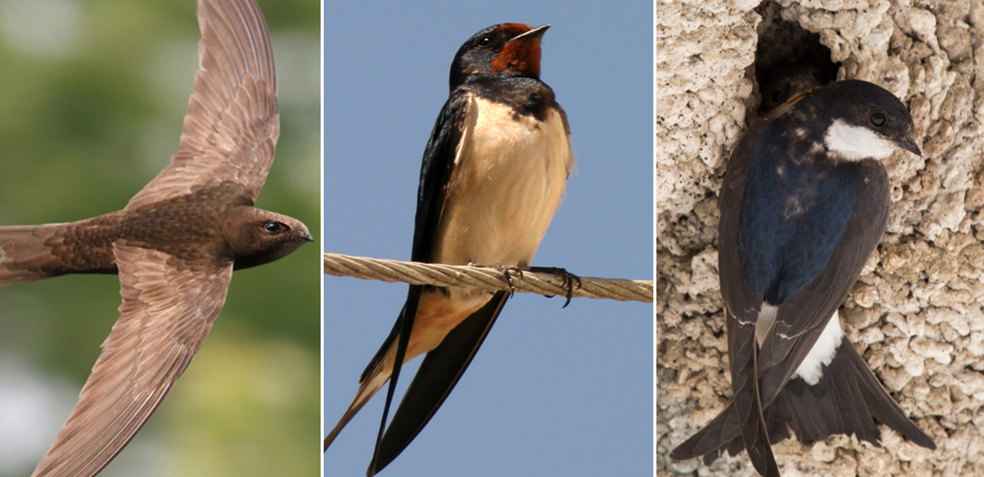- Advice
Found a baby bird?
If you find a young bird on the ground you should take no action unless you are sure that it has been abandoned. Many bird species are known to be mobile and to leave the nest at a very early age. Especially during spring it is very common to see young birds which are not fully feathered hopping around on the ground seemingly out of sight of their parents. That does not mean that the parents are absent but they might be somewhere near, watching and feeding. If you find a bird that is in an area that puts it in danger either from other people or animals, you should move the bird to a safer site, but always near to the place you found it, so that is within hearing distance from its parents.
Know the difference between a “hatchling”, “nestling” and a “fledgling”
If the bird is uninjured, then it may well be a fledgling, meaning it has naturally left the nest (fledged) and has short adult-like feathers but is still being fed by its parents. It might be sitting on the ground or hopping about, but can’t quite fly. However, its parents are probably nearby, collecting food or keeping a watchful eye where you cannot see them. Removing a fledgling from the wild reduces its chances of survival.
If you find a young bird that is unfeathered or covered in fluffy down (a nestling or a hatchling if eyes not yet open) then it has clearly fallen from the nest by accident and you should return it to the nest. Birds, in contrast with mammals, do not reject their offspring because of the smell that can be transferred from humans as they handle a nestling. If returning the nestling to the nest is not possible then the nestling depends on humans for hand rearing. This task is not to be taken lightly and is best undertaken by an experienced rehabilitator, especially if the species concerned is rare.
If you need to intervene, here's what you can do
Quickly find a cardboard box. Place some newspaper or paper towels on the bottom and open small holes to allow ventilation. You should never hold a bird too tightly but be firm and gentle. The right way to hold a bird is to place your hand over the bird so the birds’ head is between your index finger and your middle finger while the rest of the hand is around the bird’s body. Place it inside the box after you carefully give it some water. The box should be left in a quiet place (somewhere warm if it’s winter, and somewhere cool if it’s summer) so that the bird can relax.
Seek help
Please note that, while BirdLife Cyprus is able to offer some first aid to injured birds, as a conservation organisation we do not deal with animal welfare matters, we are not a rehabilitation centre and have no facilities for keeping birds in captivity, regardless of species or reason. For this reason, we are not able to assist with a bird that needs veterinary or captive care.
The Game and Fauna Service has a rehabilitation centre where it treats injured or baby birds and the wardens there are the most appropriate people to treat such wild birds. Please contact the Game and Fauna Service and wait for them to collect the bird.
- Nicosia District Office: 22662428, 22664606 (office hours), 99445697
- Larnaka / Famagusta District Office: 24805128 (office hours), 99634325
- Limassol District Office: 25343800 (office hours), 99445728, 99628338
- Pafos District Office: 26306211 (office hours), 99445679
- Game and Fauna Service Head Office (Nicosia): 22867786
You should never try and feed or give any type of medication to the bird as it is possible that you could cause further damage.
If you are in any doubt of what to do, please give us a call immediately on +357-22-455072 to give you further instructions.
Don’t raise baby birds yourself
It is illegal to bring a baby bird home and try to raise it. Most young birds won’t survive if cared for by well meaning but inexperienced people. Those that do survive will be at a disadvantage. They’ll have missed important lessons that they would have learned from their parents, such as how to find food and water in the wild and how to avoid predators.
Swifts, Swallows & House Martins

The only exceptions are swifts, swallows and house martins, which are able to fly well as soon as they leave the nest, and should never be found on the ground. The Common Swift Apus apus needs a high platform from which to take off, so if you see this species on the ground it might not be injured – it may just be stranded. So in this case the best thing to do is pick it up and simply let it fly out of a high window. Barn Swallow Hirundo rustica chicks also fly straight from the nest, so should never be found on the ground.
If you are in any doubt of what to do, please give us a call immediately on +357-22-455072 to give you further instructions.
